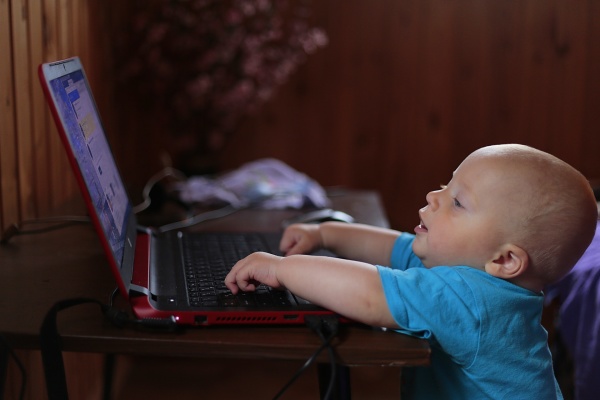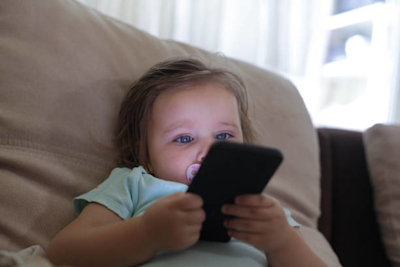
Don’t Let Your Child Use Wireless Devices Before They’re Two
We all know how tempting it can be to keep a child quiet using wireless devices, but did you know that use of technology before the age of two might not be the best idea? It’s well documented, the American Academy of Pediatrics (AAP) released recommendations for media use among children stating that infants from 0-2 years old shouldn’t experience any screen time at all.
One of the authors of these guidelines, Dr. Jenny Radesky, an assistant professor of developmental and behavioural paediatrics at the University of Michigan C.S. Mott Children’s Hospital, said that this AAP report was made to make families aware that young children are unable to interact properly with the media.[1] They experience screens in a different way to us as they are still trying to make sense of the world around them.
At such a young age, leaving your child alone with a television set, a phone, laptop or tablet isn’t advised. Advertising might claim that your baby can learn from screen media (by using educational apps and games) but this isn’t true for infants. Radesky said that babies aren’t able to comprehend information which is screened on electronic devices, until around 18 months old. It isn’t beneficial to their mental development and it may even be harmful to them, especially when we consider the low exposure to non-ionizing radiation.
The APP recommendations go further:
Infants aged 0-2 years should not be exposed to technology at all.
Children aged 3-5 years are advised to only use laptops or tablets for one hour per day.
Children aged 6-18 years are restricted to two hours per day.
The latter (6-18) being the most troublesome for parents due to a lot of homework now being assigned online.
The reality of the situation
The time children spend in front of electronic devices continues to grow, according to a report by Common Sense Media.[2] The usage of mobile phones in 2013 for children under the age of eight was on average just 15 minutes per day. Today, in 2017, it is 48 minutes, that is just the number of smartphones, 42% of those kids have their own tablet, a few years ago only 7% of children were in possession of electronic devices.
Common Sense Media’s report on technology addiction (2016) shows that children aged 8-12 years old spent an average of almost six hours per day using media, including social media (despite most age restrictions starting at 13), watching television, playing video games, using the Internet and listening to music. For teenagers (13-18 years old) the number is even higher, at almost nine hours a day.[3]
The experts say time spent online will continue growing based on every new report released, each one shows how much stronger the impact technology has on children is. When exposure and use of mobile devices by young children was researched in 2015, it showed that in most households there are televisions (97%), tablets (83%) and smartphones (77%) and almost all children (96,6%) started using them before age of one.[4]
When you are a parent of an infant, you probably don’t want them to spend so much time in front of electronic devices. Your intuition is followed by scientific research. In 2011, the WHO stated that EMFs are possibly carcinogenic and were included in the 2B list, among other carcinogenic factors such as lead, chloroform and gasoline fumes.
It is obvious that parents wouldn’t expose their children to toxic fumes, so why do most people expose their children to electromagnetic fields?
Dr. Devra Davis, one of the most well-known specialists in the field of electromagnetic exposure, has lectured worldwide about the health effects of exposure to radiation among children. Electromagnetic fields are more harmful to them because of their thinner skulls, different dielectric properties and the development of their brains.[3] It makes their absorption even higher than in adults, for example, when they use mobile phones in direct contact with their head.
Multiple scientific studies have proved that children absorb more microwave radiation than adults and one of them has shown it to be two times higher, while others stated it is even more.[4] Professor Bortkiewicz has to lead the meta-analysis on mobile phone use and risk for intracranial tumours and salivary gland tumours. It has shown that in “people who had started using the phone on a regular basis before they were 20 years old, the risk of ipsilateral glioma was found to be fourfold higher”.[7]
That means in the long-term, the adverse health effects of overusing electronic devices by children may have a serious impact on their health. Many governments worldwide (for example in Belgium or France) are aware of the possible risks so they are issuing warnings about children using electronic devices. They are not widely known publicly. Even when some limits and recommendations are included in the manuals attached to devices, they are rarely read by users. For laptop computers and tablets it is stated that they should be kept at the minimum distance of 20 cm from the body,[5] for mobile phones, the limit is at least 1 cm.
Exposing your baby to non-ionizing radiation from birth is not healthy for them and it may result in future health problems. There is no need to drastically change your habits. You don’t have to throw away all of the electronic devices in your household. There are simple rules that should be implemented in your daily routine so that your child will be safer. They are based on the American Academy of Pediatrics’ advice.[6]
Parents should prioritize spending unplugged and creative playtime with their infants and toddlers. One of the researchers has shown that 70% of parents give electronic devices to children under age of four when they are doing household chores and 65% of them do it just to keep them calm.[7] It is fine as long as it is not a habit. It is more beneficial for your child’s development to spend time offline.
If you want to educate your child with learning apps, remember that the soonest you can start to introduce your child to screen time is around 18 months old. Infants would not understand anything before that age. Be careful when choosing programs, they should be of a high-quality and educational. It is best to watch these programs with your child to help them understand what they see if they are very young.
Make sure your child has other activities, such as physical ones, make sure they sleep well. Using electronic devices before bedtime may interfere with melatonin levels which affects the quality of sleep,[8] especially in young children.
There are other matters associated with electronic device use among children, such as when you should give your child their first smartphone. We wrote about it in our earlier article here.
The American Academy of Pediatrics (AAP) is a professional association of paediatricians, founded in the 1930s. Today, it has over 60 thousand qualified members. It publishes ‘Pediatrics’, its flagship journal. If they advise something to parents, it is proven and reliable. We wanted you to know their opinion on using electronic devices with children. It is said: no use of any wireless devices before the age of two. Let your child be safer and healthier. There is no use in exposing them to radiation so soon. Plus, you can easily find more creative ways to spend time with them!
Is there anything you’d like to add, have we missed anything? If you’re interested in sharing your experiences with us or writing a guest post for us, send us an email via hello@mudita.com!
Please feel free to get in touch via social media (send us some photos or videos too), you can find us on Facebook, Twitter and Instagram, let’s connect! To learn more about Mudita, take a look at our website and our other posts.
If you enjoyed reading this article, please share and recommend it!
Related stories

Digital Wellness: Teach Your Child Healthy Technology Habits
Children quickly absorb content and change their habits, they get bored easily and studies show that almost 50% of school-age children use smartphones.

6 Sources of Radiation In The Home
There are many electronic devices in our homes. Find out what electromagnetic radiation (EMF) can emit.

How Old Should Your Child Be Before Owning a Smartphone?
Before you give your child a smartphone, consider all of the pros and cons. If a child gets an electronic device too soon, it may cause some issues.
If you'd like to receive the best stories from our blog, keep up to date with our progress and get notified about our product releases and special discounts.